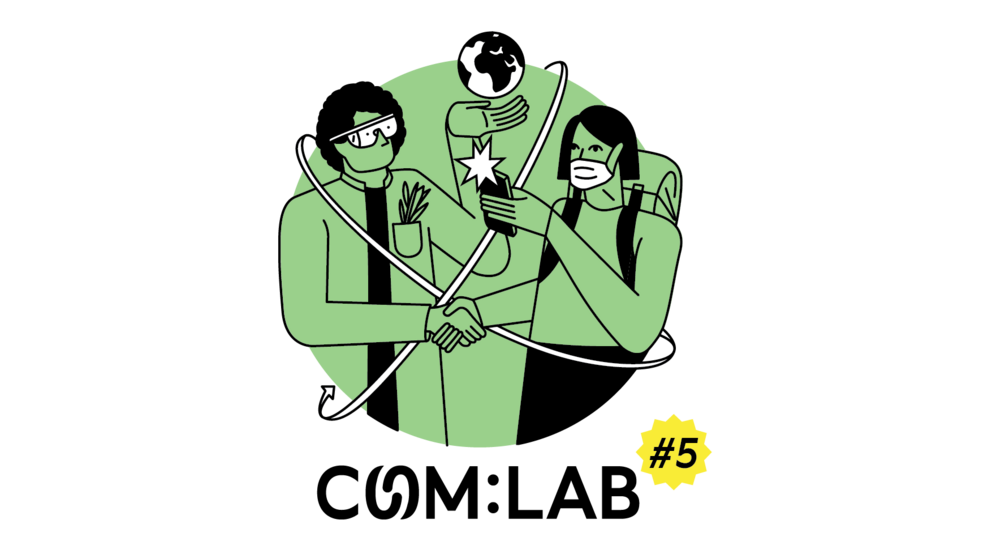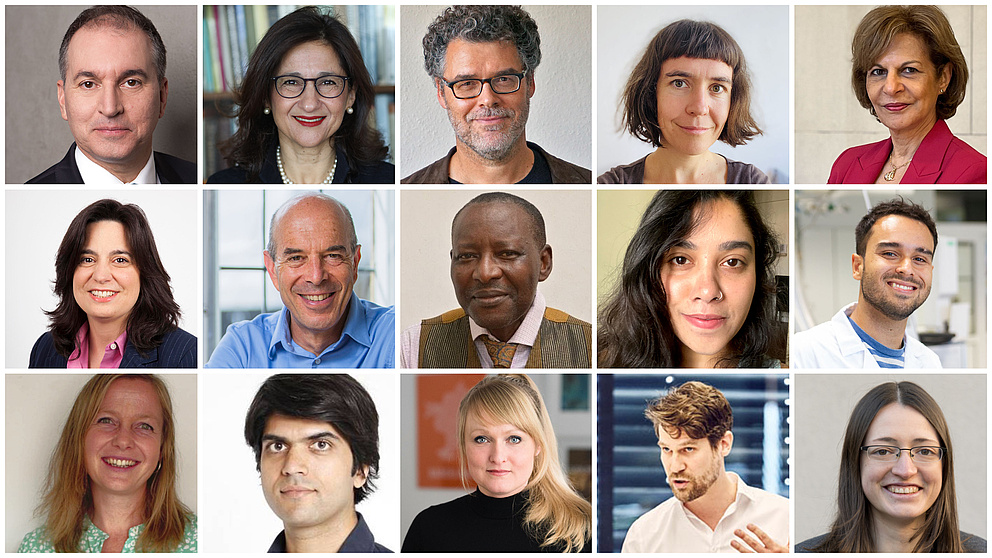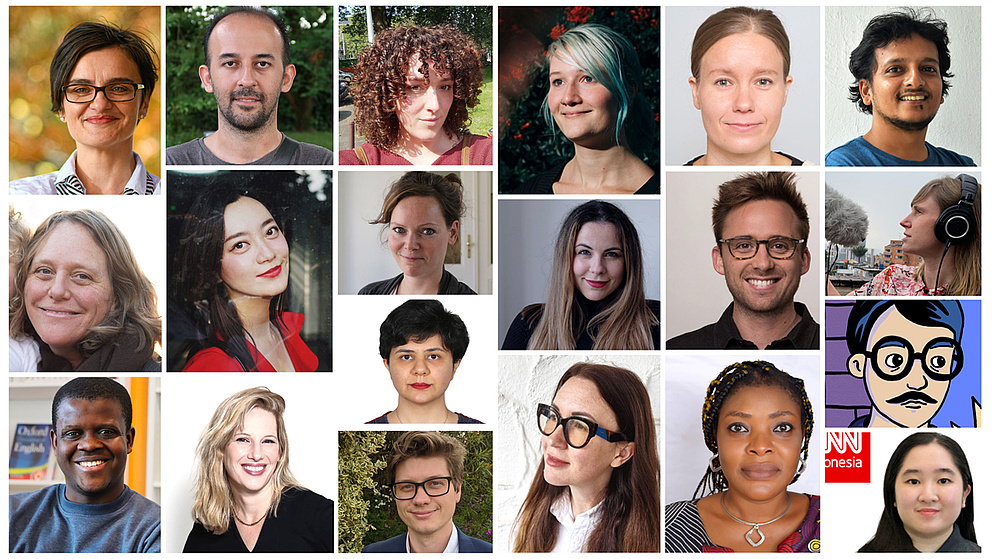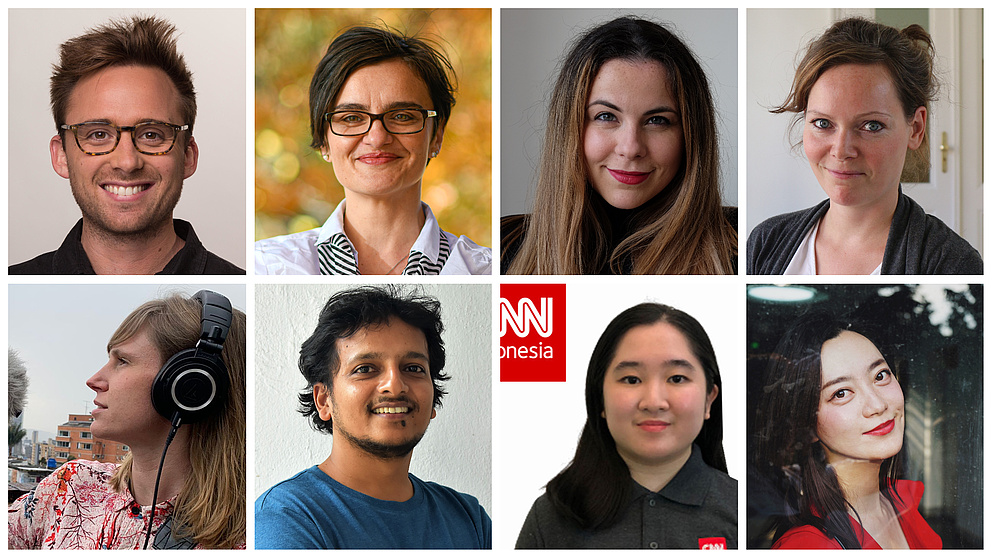Jump to the content
- {{#headlines}}
- {{title}} {{/headlines}}


Humboldt Communication Lab
A conversation between science and the media: twice a year, ten Humboldt Fellows and ten early-career journalists get together with the aim of learning from one another.
ComLab#5
Without sharing ideas, goods and common human values around the world, our lives would be much poorer and even endangered. The global movement of people, raw materials and innovations changed our lives for the better and continues to do so. Yet, the pandemic, political upheaval, and resource dependencies pose new challenges to the idea of a collaborative international community.
Cross-border phenomena like (climate) migration and COVID-19 are causing us to rethink established notions of mobility, international trade and work, and the way we treat the environment. They are reminding us that resources are finite, and the global community is vulnerable, raising the question as to what the future of globalisation and exchange will look like. What lessons can be learned from current crises? How can goods and ideas be shared globally in a sustainable, fair and more secure way? What opportunities are inherent in digital infrastructures and services? How should we envision human mobility and migration? How can we respond to increasing political isolationism and nationalist ideologies?
The fifth Communication Lab explored the future of global exchange in its political, social, economic, and ecological dimensions. Science and the media can point the way to innovative approaches and best practices for our future global community.
Speakers

(in alphabetical order) Dr Eduardo Queiroz Alves (Alfred Wegener Institute), Wella Andany (CNN Indonesia), Dr Annegret Burkert (Science Media Center Germany), Vito Cecere (Federal Foreign Office), Professor Mariette DiChristina (Boston University), Alexandra Eul (freelance journalist); Professor Ian Goldin (University of Oxford), Priya Goswami (Mumkin), Lise Josefsen Hermann (freelance journalist), Shada Islam (New Horizons Project), Alok Jha (The Economist), Dr Jens Radü (DER SPIEGEL), Professor Steve Tonah (University of Ghana), Professor Thorsten Wagener (University of Potsdam), Rebecca Winkels (Wissenschaft im Dialog)
Participants

(in alphabetical order)
Humboldtians: Dr Oluwayemisi Olusola Adebomi, Veeresh Anehosur, Dr Amadeo Gandolfo, Dr Elizabeth Gruber, Dr Rhys Jacob, Dr Raika Khorshidian, Dr S. Jalal Mirnezami, Dr Mengdi Tao, Professor Mirela Tulbure, Professor Kelly J. Whitmer
IJP Alumni/Journalists: Paul Adepoju, Netta Ahituv, Olga Cherkez, Trisha Dantiani, Amie Liebovitz, Johanna Lipsanen, Lisbeth Schröder, Carl Smith, Sarah Tekath, Martina Weber

Press releases on ComLab#5
The winning projects
The best projects from the fifth Communication Lab, “The New Global – Cooperation for the Future”, were honoured at a virtual award ceremony on 2 September 2022. The prizes for the four most compelling pieces go to:

- the journalist Carl Smith (Australian Broadcasting Corporation) and the data specialist Mirela Tulbure (Center for Geospatial Analytics, North Carolina State University) for their audio documentary “Meet the communities using their own backyards to try to tame the next big flood” about grassroot communities that have teamed up with scientists to prevent disastrous floodings.
- the journalist Amie Liebowitz (BBC) and the geographer Elisabeth Gruber (Friedrich-Alexander-Universität Erlangen-Nürnberg) for a story pitch about a municipality in Austria that is breaking new ground in helping refugees and integrating them in the tourism sector.
- the journalist Martina Weber (freelancer) and the sustainability researcher Veeresh Anehosur (Nunam) for their radio play “The E-E-Room (The Energy-Emergency-Room)” about the global dimensions of second-life use of lithium batteries.
- The special award goes to the journalist Trisha Dantiani (CNN Indonesia) and the media scientist Mengdi Tao (Tsinghua University, Beijing) for their project “Refugee Reels” that examines the experience of young refugees in Indonesia through Instagram.
The journalist Lisbeth Schröder and the sociologist Amadeo Gandolfo received an honourable mention for their project “Drawing for health - how making a comic can help to cope with mental problems” – a fanzine combining testimonies by people affected, scientific facts, and comics on the topic of mental health problems.



